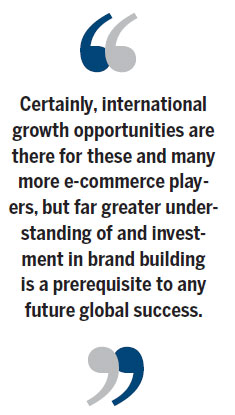Tracking the next step to success

Viable overseas plans can help alibaba and other Chinese firms achieve sustained gains
Global e-commerce sales are forecast to increase by more than 20 percent this year, and surpass $1.5 trillion. Even more significant is the growth predicted in the Asia-Pacific region, which this year is set to topple the United States as the largest market in the world by sales revenue.
At this stage of market evolution it is still unclear which countries and companies will benefit most from this massive market surge. The US, with its array of world-famous Internet brands such as Amazon, eBay, Facebook and Twitter, is considered by many to be likely to enjoy substantial gains. However, the global e-commerce market, which is still very much in its infancy, does not contain any dominant brands despite the awareness and recognition levels enjoyed by the US companies.
This lack of strong e-commerce global brands, combined with the rise of the Asia-Pacific e-commerce market, paves the way for the international emergence and dominance of many of the lesser-known e-commerce industry players.
Nowhere is the e-commerce market more dominant than in China where social media consumption in particular has contributed to an unrivalled frenzy of excitement and competition.
It is this intense competition, particularly across the Chinese mainland, that could propel one or more of the many industry players to international dominance over the coming years. Three of the more likely Chinese e-commerce providers which could capitalize on the opportunity to go global are: Alibaba, Vancl and Jingdong, all of which have been pursuing international market expansion strategies since 2010.
Fourteen years after its founding, Alibaba is the world's largest online business-to-business platform delivering e-commerce solutions for small businesses worldwide.
However, younger industry players such as Vancl, China's biggest fashion e-tailer, and Jingdong Mall (JD.com, which until recently was called 360buy.com), the second-largest business-to-consumer online retailer in China are following fast in Alibaba's footsteps.
Undoubtedly each of these e-commerce players can congratulate themselves on their success across the Chinese mainland. But what are their prospects as they aim to expand internationally?

Certainly, international growth opportunities are there for these and many more e-commerce players, but far greater understanding of and investment in brand building is a prerequisite to any future global success.
Despite launching its international website in 2010, it was not until March this year that Vancl started to invest more resources in its global strategy. Vancl is to be applauded for its overseas moves and its palpable ambition to succeed. But far more attention should be paid to brand building as overseas brand awareness remains poor.
Jingdong also ventured overseas relatively early with the launch of its global website (in English) in October 2012 and should also be commended for doing so. But Jingdong has not invested much in building corporate brand awareness and image levels globally. Furthermore, Jingdong remains committed to a strategy of low cost with minimal transfer of key personnel to international cities.
In contrast, Alibaba, with its charismatic founder Jack Ma, has not shied away from international publicity-building activities. That is why Alibaba has positioned itself very much as the front-runner in the race for global success between e-commerce players from emerging markets.
Alibaba is also well ahead in the race to list its shares on the US stock market, which is likely to take place within the next few months. This will be an enormously positive source of international corporate brand awareness and image building.
The name "Alibaba" also provides an advantage internationally, with few around the world unaware of the character, Ali Baba, and the surrounding story. The names Vancl and JD do not enjoy such a natural head start in their quest for global recognition.
Of course, corporate brand building is a necessary condition for global success but on its own it will not lead to success. Chief among the other key factors are localization and customization of websites, payment options and methods, and flexibility in transport methods.
Over the past few years Chinese e-commerce providers have demonstrated progress in these tactical issues but now need to take a far more strategic perspective.
The e-commerce market is new and emerging exponentially but long-term success is almost certainly going to involve the building of a competitive brand image, not just an efficient, well-organized operation.
The race is on, therefore, for the first global e-commerce corporate brand, and Alibaba and its Chinese competitors should focus on the investment and associations needed to ensure sustainable success overseas.
The author is a visiting professor at the University of International Business and Economics in Beijing and a senior lecturer on marketing at Southampton Solent University's School of Business.
(China Daily European Weekly 05/23/2014 page9)
Today's Top News
- Takaichi must stop rubbing salt in wounds, retract Taiwan remarks
- Millions vie for civil service jobs
- Chinese landmark trade corridor handles over 5m TEUs
- China holds first national civil service exam since raising eligibility age cap
- Xi's article on CPC self-reform to be published
- Xi stresses improving long-term mechanisms for cyberspace governance






























